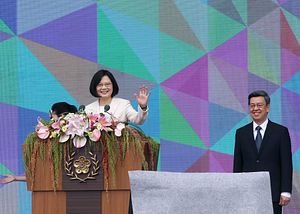Now that Tsai Ing-wen has been inaugurated as the first female president of Taiwan, attention will be shifted to her policies, especially her policy toward mainland China. During her inauguration speech, Tsai Ing-wen did not explicitly acknowledge the “1992 consensus,” nor did she deny the facts of the 1992 meetings. Such a vague approach was not surprising because Tsai needed to please her own more independence-oriented supporters while at the same time avoiding anger from the mainland side. So far so good. But there are three important political and economic reasons why the Tsai administration will face great challenges moving forward.
First, Tsai is known for being a staunch supporter of Taiwanese independence as she was one of the main architects behind former president Lee Teng-hui’s “special state-to-state relations” speech in the 1990s. Over the last eight years, Tsai has been very careful in outlining her ideas for Taiwan independence, but few analysts believe that she has changed her mind. Most would agree that she has adopted a gradualist approach toward Taiwanese independence given the political realities in cross-strait relations.
Since Tsai’s election victory in January 2016, the mainland has been very patient in judging her policy preferences. In traditional Chinese words, the mainland is “listening to Tsai’s words and observing her actions.” Chinese President Xi Jinping warned last year that an “earthquake” would occur if Tsai were to turn to a more radical position on Taiwan’s independence. Even if Tsai wants to be more moderate and choose the middle road, the more extremist factions within her DPP party might push for radical actions toward independence. If this were to occur, Tsai would face a dilemma: how to please these two very different audiences. We can’t predict what she would do, but the picture will not be pretty.
Second, Tsai faces tremendous economic challenges as Taiwan’s industrial competitiveness continues to decline. Once a proud “small dragon” economy in East Asia, Taiwan now is the worst performer, lagging far behind its competitors such as Singapore and South Korea. Taiwan’s growth in 2016 to date may even have been negative, thus further constraining Tsai’s policy options. Left alone, the economy would certainly bring down her approval ratings.
Worried about potentially being dependent economically on the mainland, Tsai has opened a new office for a “new south forward policy,” possibly with the intention of seeking more capital and investment in other Asian countries rather than from the mainland. This policy is doomed to fail, just as former president Chen Shui-bian’s “go south” policy failed miserably. It makes sense, from Tsai’s point of view, to diversify Taiwan’s economic structure, but unfortunately, for a small island and export-oriented economy like Taiwan’s there are not a lot of good options.
Finally, regional politics and tensions could derail Tsai’s domestic agendas. As some analysts (here and here) have already pointed out, there is a high chance that in 2016 we could see multiple crises erupting in the East Sea, South China Sea, and Taiwan Strait. This is a result of great power politics and regional competition in Asia, which is out of Taiwan’s control. Tsai Ing-wen and the DPP do not have many good policy options, especially because the U.S. is the real hegemon in East Asia. There is also the uncertainty surrounding the U.S. presidential election, which could see Donald Trump emerge as the new president. Given Trump’s previous hostile comments toward America’s Asian allies, it is not impossible that Trump, if elected, would reconsider U.S. security commitments toward Taiwan.
It is nice to win a presidential election, but it is much harder to govern effectively, as amply evidenced by former president Ma Ying-jeou. Now it is Tsai Ing-wen’s turn to face the heat and she may soon find herself become very unpopular if she mishandles some of these hot issues.

































